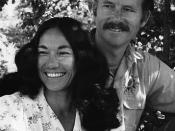On December 7, 1941, the United States entered World War II, when the Japanese bombed Pearl Harbor in Hawaii. Therefore, President Roosevelt signed Executive Order 9066, which gave the War Department the authority to designate military areas and to exclude from these areas anyone who might threaten the war effort (Wakatsuki-Houston and Houston xiv). This order was meant for all of the Japanese and Japanese-Americans that were living in the United States during this time. They were sent to internment camps; consequently, something similar to the concentration camps. In Farewell to Manzanar, by Jeanne Wakatsuki-Houston and James Houston, Jeanne tells the true story of her family's and her experience while forcibly sent to an internment camp in Manzanar, located in the Owens Valley of California, and how their lives were affected both during and after being in this camp. While separated from the patriarch of the family, Ko Wakatsuki, they face many hardships and much hatred during some of their struggle in Manzanar.
The struggle of the Wakatsuki family continues when Ko meets his family in the camp, and their subsequent reentry into society. As Jeanne reflects on her life during World War II, she tries to make sense of and understand this traumatic and confusing time in her life. Facing racial prejudice, the burden of war and the steady deterioration of the family, Jeanne must come to terms with these dilemmas as a young, adolescent girl.
Before the Japanese bombed Pearl Harbor, the Wakatsukis were living a normal existence in a modest house in Ocean Park, California. Papa (Ko) Wakatsuki was a commercial fisherman with his own small fleet of boats, "The Nereid" and "The Waka" (Wakatsuki-Houston and Houston 4). Their lives seemed to be generally copacetic until one day in December of 1941. Papa and Jeanne's brothers,


